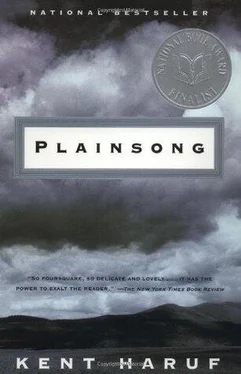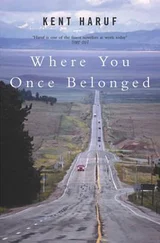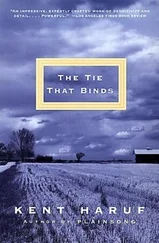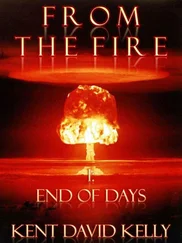Is he all right? the girl said.
Appears like it, Raymond said.
Until somebody gets after him, Harold said, chasing after him in a pickup with coyote dogs. And shoots him.
Do they do that?
They do.
They drove on. There were farm houses scattered and isolated in the flat sandy country, with barns and outbuildings down below them, and dark windbreaks of trees in the far distances, showing where a farmstead was now or once had been. They drove past one farm beside the highway where there were quarter horses and a red barn and where the man had poked worn-out cowboy boots upside down over the tops of the fence posts along the road for an eighth of a mile, for decoration. At Red Willow they turned west and drove on, past the country schoolhouse at Lone Star and across the high open wheatland, and after a while they topped a rise and could see down into the South Platte River valley, wide and tree-lined, the cliffs far away on the other side, with the town laid out below. They fishtailed down, crossed the interstate highway and entered the outreaches of Phillips.
By now it was about one-thirty. They parked at the curb across from the courthouse and went into a little local café for lunch and sat down at a table with a green tablecloth quartered over it. The noon-hour rush was finished and they were the only customers. In a moment a woman got up from the counter where she’d been smoking and resting and brought them water glasses and menus. The girl ordered a grilled cheese sandwich and tomato soup. Raymond said to her, You better get you more than that. Don’t you think, Victoria? It’s a long time till supper.
The girl asked for a glass of milk.
Bring her a tall glass, would you, ma’am? Raymond said.
What about you two gentlemen? the woman said.
Both of the McPheron brothers ordered chicken fried steaks which came with mashed potatoes and green beans and canned corn and a carrot Jell-O salad.
Them are good to eat, the woman said.
That so? Harold said.
I like em myself, she said.
That sounds encouraging, if the help eats the food, he said. What kind of gravy comes with it?
Yellow.
Put some of that on the steaks too, would you?
I can tell him. I don’t do it myself.
If you would, he said. And some black coffee too, when you get a decent chance. Thank you kindly.
The woman put in their order and brought their coffee and milk, and in a short while she brought out their platters of food. They sat at the table in the little café and ate quietly, deliberately. When the brothers were finished they ordered themselves and the girl Dutch apple pie with a scoop of ice cream on top, but she could only eat half of hers. They paid the bill and walked up the block to the department store.
The shop windows out front had sets of bedroom furniture and living room sofas and lamps on display. They went inside the store and were met at once by a brisk short middle-aged woman in a brown dress. May I help you? she said.
We’re looking for the crib section, Harold said.
Baby cribs?
Yes, ma’am. We’re in the market for one. He winked at the girl. We want to consider your selection.
If you will follow me, the woman said.
They followed her back through the store aisles to a far corner. Here you see what we offer, she said. There were a dozen new baby cribs assembled and set up, fitted with mattresses and baby blankets, displayed among matching chests of drawers and changing tables. The brothers surveyed them and were astonished. They glanced at the girl. She stood aside, not saying anything at all.
Maybe you better just tell us about em, Harold said.
I’d be happy to, the woman said. The features you look for in a baby crib include this nontoxic easy-care finish. This plastic teething rail. This one side which raises and lowers for easy access. These hooded casters. This one-piece mattress support here. The brackets like these on this model so the mattress can be adjusted to various levels. This one offers a rail which lowers by knee pressure while the rail on this one lowers when you release these two catches. This model here permits you to convert it to a toddler’s daybed by removing the rail altogether.
She stopped and waited, her hands behind her back. Did you have any questions?
Why ever would you want hooded casters? Harold said.
For decoration.
Ma’am?
It looks better.
I expect that’s important, how the wheels look.
It’s an added attraction, she said. Some people prefer it.
I see, he said.
The McPheron brothers approached the baby cribs and began to inspect them closely. They manipulated the moveable sides, raising them and lowering them, and walked around each of the cribs and adjusted the height of the supports and peered underneath, and they pushed them and rolled them forward and backward. Raymond leaned over and punched down on one of the crib mattresses, causing it to bounce.
What do you think, Victoria? he said. How about this one?
It’s too expensive, she said. Every one of them is.
You let us worry about that. Which one of these do you like best?
I don’t know, she said. She looked around. This one, maybe. She indicated the least costly one.
That’s a nice one, Raymond said. I kind of like this one here, myself. They went on looking.
Finally the McPheron brothers chose the crib which converted to a daybed, the most expensive of the lot. It had carpenter-turned spindles and actual wood headboards. It seemed substantial to them and the side that was adjustable moved easily on its slides. They believed the girl would have no difficulty with it.
You have this in stock, I guess, Harold said.
Surely, the woman said.
Why don’t you bring one of em out.
But you understand it doesn’t include the mattress.
Doesn’t?
No. Mattresses are not included. Not at this price.
Well, ma’am, Harold said. We need a crib. And we’d rather to have a mattress to go with it. This girl’s going to have a baby and it can’t sleep on a board. Even if the board can be adjusted to three different levels.
Which one would you care to have? the woman said. They come in these possibilities.
She began to show them the mattresses. They chose a solid one which felt sufficiently firm when they squeezed it and turned it over, and afterward they selected several crib sheets and warm blankets.
The girl watched it all from a kind of abject distance. She had grown increasingly quiet. At last she said, Can’t you wait? It’s too much. You shouldn’t be doing all of this.
What’s the matter? Harold said. We’re having us some fun here. We thought you was too.
But it’s too expensive. Why are you doing this?
It’s all right, he said. He started to put his arm around her, but stopped himself. He looked down into her face. It’s all right, he said again. It is. You’ll just have to believe that.
The girl’s eyes filled with tears, though she made no sound. Harold took out a handkerchief from the rear pocket of his pants and gave it to her. She wiped at her eyes and blew her nose and handed it back to him. You want to keep it? Harold said. She shook her head.
The woman said, You do still want these?
Harold put the handkerchief away and turned to face her. That’s right, ma’am. We haven’t changed our minds. We still want em.
Very well. I just wanted to be positive.
We’re positive.
She called a stock boy and sent him back to the storeroom and he came out wheeling two large flat cardboard boxes on a dolly. He drew up at the counter.
The woman rang up their purchases. She said, Will this be cash or charge?
I’ll sign you a bank check, Raymond said. He bent over the counter, leaning on his elbow, and wrote stiffly into his checkbook. When he had finished he inspected what he had written, then he folded it once and tore it off and blew back and forth over it and handed the check to the woman. She looked at it.
Читать дальше







